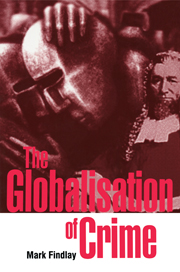Book contents
- Frontmatter
- Contents
- Preface
- Acknowledgements
- Introduction: Notions of context and globalisation
- 1 (Mis)representing crime
- 2 Crime and social development
- 3 Crime and social dysfunction
- 4 Marginalisation and crime relationships
- 5 Crime economies
- 6 Crime as choice
- 7 Integrating crime control
- Epilogue
- Bibliography
- Index
7 - Integrating crime control
Published online by Cambridge University Press: 22 September 2009
- Frontmatter
- Contents
- Preface
- Acknowledgements
- Introduction: Notions of context and globalisation
- 1 (Mis)representing crime
- 2 Crime and social development
- 3 Crime and social dysfunction
- 4 Marginalisation and crime relationships
- 5 Crime economies
- 6 Crime as choice
- 7 Integrating crime control
- Epilogue
- Bibliography
- Index
Summary
Introduction
The contextual understanding of crime choice and crime relationships from the local to the global provides the impetus for an integrated response to the problem of crime. That response will recognise the utility of crime, along with the significance of tolerance and re-integration, for its place within globalisation.
Integration is foreign to contemporary crime control. Even the recent promotion of re-integrative approaches to crime (see Braithwaite, 1989) depend upon preliminary control processes which classify deviance as difference. That difference becomes the fulcrum for re-integration, as it does for conventional crime control strategies.
Crime control in modernised ‘communities’ is highly bureaucratised and representational. State prosecutors stand between the offender and the victim, representing individual interests on behalf of the state. These bureaucracies also advance their own interests through the monopolisation of formal crime control. Integration in a control context, on the other hand, recognises the limits of crime control bureaucracies while stressing the essential progress from tolerance to re-integration. Tolerance precedes conventional control intervention and is, after all, the predominant response to crime. Control initiatives require the balance of re-integration if they are to avoid the negative consequences of stigma and social isolation.
Representations of crime are set apart from legitimised behaviours and reactions through tolerance. Representations of crime can be reversed through re-integration. Atmospheres of tolerance and re-integration should help prioritise control choices and pre-determine the contexts within which these choices are more influential.
- Type
- Chapter
- Information
- The Globalisation of CrimeUnderstanding Transitional Relationships in Context, pp. 186 - 220Publisher: Cambridge University PressPrint publication year: 1999



